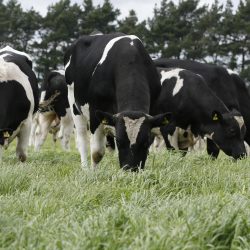Persistently Infected (PI) breeding bulls are a significant threat to the reproductive performance of breeding cattle.
Effects of BVD infection in the breeding cow/heifer include:
- Decreased conception rate
- Early embryonic and foetal loss
- Abortion
- Premature births and still births
- Weak/dummy calves
- Congenital defects
- The birth of PI calves, which results in the continuation of the disease in the population and can result in delayed losses due to ill thrift and mucosal disease.
It is highly desirable that PI bulls are identified and culled prior to sale or service.
BVD in Bulls
PI breeding bulls may impact animal health and reproductive performance via;
- The non-venereal, horizontal spread of virus to in contact naïve cows/heifers during breeding or pregnancy.
- Venereal transmission of virus directly into the reproductive tract which can affect conception and fertility of the dam being bred.
- Poor semen quality.
It is estimated that 1% of the adult bull population are persistently infected BVD carriers.
Blood Test
- Bulls to be blood tested for BVD antigen (Ag) prior to first mating.
- The new PCR test can test at any age and costs less.
- Collect a serum sample into a plain vacutainer.
- Use a new needle for each bull.
- Record owner and bull identity on the vacutainer.
BVD Status
BVD Negative
- Bulls testing BVD antigen ELISA negative at the initial test are not PI and may be used for service.
BVD Positive
- Bulls testing antigen ELISA positive at the initial test are probably PI and the general recommendation is that they are culled
- If culling is undesirable for any reason (for example if the bull is valuable) the bull should be quarantined and a second test taken 28 days later. If this second antigen ELISA test is negative, the bull is deemed to have been transiently infected but is now non-viraemic and can be assigned BVD Negative status.
BVD Persistently Infected
- Bulls testing antigen ELISA positive at both the initial test and again 28 days later are confirmed Persistently Infected (PI) and culled.
Vaccinate
- BVD Negative bulls should be vaccinated prior to mating to prevent transient infection.
- (Bulls over 8 months of age which are known to be antibody ELISA positive do not require vaccination).
- Vaccination should be carried out according to the manufacturer’s recommendations.
- Previously unvaccinated bulls require 2 vaccinations. (For practical reasons first vaccination may be given when bulls are initially blood tested).
- Annual Booster: Previously vaccinated BVD Negative bulls will require a single annual booster vaccination prior to mating.
- There are at least 2 different vaccinations available – talk to the Vet for which one applies to you.
Certification
Bulls can be certified according to the status defined above and vaccination status can be recorded.
Bulls intended for service of dairy cattle
It is recommended that bulls intended for service of dairy cattle are tested for EBL at the same time as BVD, as part of an overall bull soundness examination.

